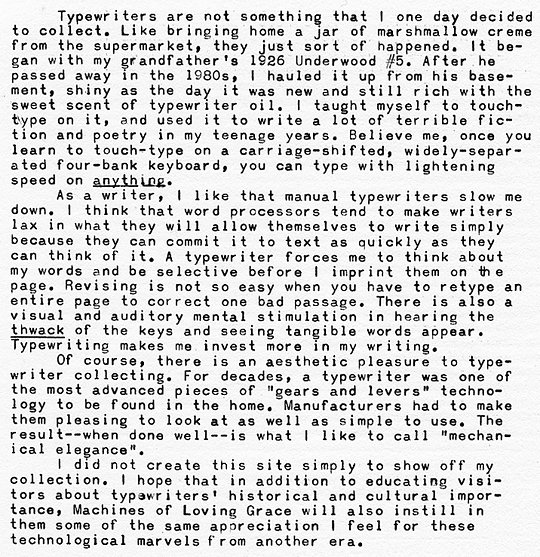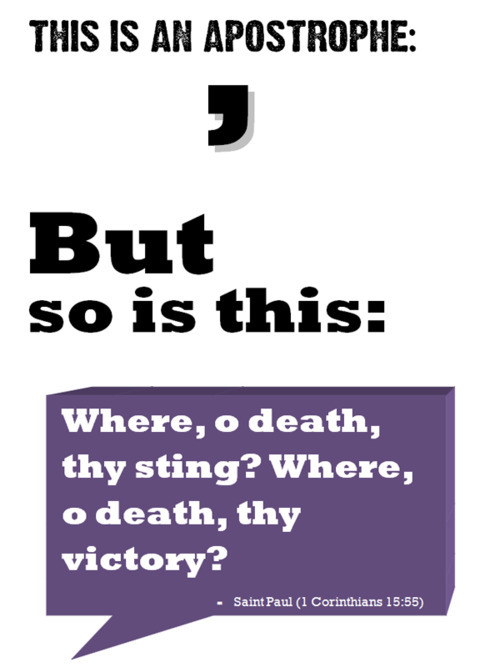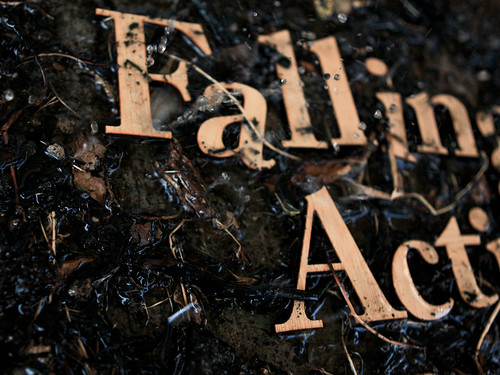31. Dialect: the language of a particular district, class or group of persons;
the sounds, grammar, and diction employed by people distinguished from others
32. Dialectics: formal debates usually over the nature of truth
33. Dichotomy: split or break between two opposing things
34. Diction: the style of speaking or writing as reflected in the choice and use
of words
35. Didactic: having to do with the transmission of information; education
36. Dogmatic: rigid in beliefs and principles
37. Elegy: a mournful, melancholy poem, especially a funeral song or lament for
the dead, sometimes contains general reflections on death, often with a rural or
pastoral setting
38. Epic: a long narrative poem unified by a hero who reflects the customs,
mores, and aspirations of his nation of race as he makes his way through
legendary and historic exploits, usually over a long period of time (definition
bordering on circumlocution)
39. Epigram: witty aphorism
40. Epitaph: any brief inscription in prose or verse on a tombstone; a short
formal poem of commemoration often a credo written by the person who wishes it
to be on his tombstone
41. Epithet: a short, descriptive name or phrase that may insult someone’s character,
characteristics
42. Euphemism: the use of an indirect, mild or vague word or expression for one
thought to be coarse, offensive, or blunt
43. Evocative (evocation): a calling forth of memories and sensations; the
suggestion or production through artistry and imagination of a sense of reality
44. Exposition: beginning of a story that sets forth facts, ideas, and/or
characters, in a detailed explanation
45. Expressionism: movement in art, literature, and music consisting of
unrealistic representation of an inner
idea or feeling(s).
46. Fable: a short, simple story, usually with animals as characters, designed
to teach a moral truth
47. Fallacy: from Latin word “to deceive”, a false or misleading notion, belief,
or argument; any kind of erroneous reasoning that makes arguments unsound
48. Falling Action: part of the narrative or drama after the climax
49. Farce: a boisterous comedy involving ludicrous action and dialogue
50. Figurative Language: apt and imaginative language characterized by figures
of speech (such as metaphor and simile)
51. Flashback: a narrative device that flashes back to prior events
52. Foil: a person or thing that, by contrast, makes another seem better or more
prominent
53. Folk Tale: story passed on by word of mouth
54. Foreshadowing: in fiction and drama, a device to prepare the reader for the
outcome of the action; “planning” to make the outcome convincing, though not to
give it away
55. Free Verse: verse without conventional metrical pattern, with irregular
pattern or no rhyme
56. Genre: a category or class of artistic endeavor having a particular form,
technique, or content
Sunday, January 27, 2013
Tuesday, January 22, 2013
Lit Terms 6-30
6. Analogy: a comparison made between two things to show the similarities
between them

7. Analysis: a method in which a work or idea is separated into its parts, and those parts given rigorous and detailed scrutiny

8. Anaphora: a device or repetition in which a word or words are repeated at the beginning of two or more lines, phrases, clauses, or sentences


7. Analysis: a method in which a work or idea is separated into its parts, and those parts given rigorous and detailed scrutiny

8. Anaphora: a device or repetition in which a word or words are repeated at the beginning of two or more lines, phrases, clauses, or sentences

9. Anecdote: a very short story used to illustrate a
point

10. Antagonist: a person or force opposing the protagonist
in a drama or narrative

11. Antithesis: a balancing of one term against another for
emphasis or stylistic effectiveness


12. Aphorism: a terse, pointed statement expressing some
wise or clever observation about life


13. Apologia: a defense or justification for some doctrine,
piece of writing, cause, or action; also apology


14. Apostrophe: a figure of speech in which an absent or
dead person, an abstract quality, or something inanimate or nonhuman is
addressed directly


15. Argument(ation): the process of convincing a reader by
proving either the truth or the falsity of an idea or proposition; also, the
thesis or proposition itself


16. Assumption: the act of supposing, or taking for granted
that a thing is true


17. Audience: the intended listener or listeners


18. Characterization: the means by which a writer reveals a
character’s personality

19. Chiasmus: a reversal in the order off words so that the
second half of a statement balances the first half in inverted word order


20. Circumlocution: a roundabout or evasive speech or
writing, in which many words are used but a few would have served


21. Classicism: art, literature, and music reflecting the
principles of ancient Greece and Rome: tradition, reason, clarity, order, and
balance


22. Cliché: a phrase or situation overused within
society

23. Climax: the decisive point in a narrative or drama; the
pint of greatest intensity or interest at which plot question is answered or
resolved


24. Colloquialism: folksy speech, slang words or phrases
usually used in informal conversation


25. Comedy: originally a nondramatic literary piece of work
that was marked by a happy ending; now a term to describe a ludicrous, farcical,
or amusing event designed provide enjoyment or produce smiles and laughter


26. Conflict: struggle or problem in a story causing
tension


27. Connotation: implicit meaning, going beyond dictionary
definition
Monday, January 21, 2013
Poetry Analysis
1. "Last Words" By Sylvia Plath
I do not want a plain box, I want a sarcophagus
With tigery stripes, and a face on it
Round as the moon, to stare up.
I want to be looking at them when they come
Picking among the dumb minerals, the roots.
I see them already — the pale, star-distance faces.
Now they are nothing, they are not even babies.
I imagine them without fathers or mothers, like the first gods.
They will wonder if I was important.
I should sugar and preserve my days like fruit!
My mirror is clouding over —
A few more breaths, and it will reflect nothing at all.
The flowers and the faces whiten to a sheet.
I do not trust the spirit. It escapes like steam
In dreams, through mouth-hole or eye-hole. I can't stop it.
One day it won't come back. Things aren't like that.
They stay, their little particular lusters
Warmed by much handling. They almost purr.
When the soles of my feet grow cold,
The blue eye of my turquoise will comfort me.
Let me have my copper cooking pots, let my rouge pots
Bloom about me like night flowers, with a good smell.
They will roll me up in bandages, they will store my heart
Under my feet in a neat parcel.
I shall hardly know myself. It will be dark,
And the shine of these small things sweeter than the face of Ishtar.
2. "To his Coy Mitress" by Andrew Marvell.
Had we but world enough, and time,
This coyness, Lady, were no crime.
We would sit down and think which way
To walk and pass our long love's day.
Thou by the Indian Ganges' side
Shouldst rubies find: I by the tide
Of Humber would complain. I would
Love you ten years before the Flood,
And you should, if you please, refuse
Till the conversion of the Jews.
My vegetable love should grow
Vaster than empires, and more slow;
An hundred years should go to praise
Thine eyes and on thy forehead gaze;
Two hundred to adore each breast;
But thirty thousand to the rest;
An age at least to every part,
And the last age should show your heart;
For, Lady, you deserve this state,
Nor would I love at lower rate.
But at my back I always hear
Time's wingèd chariot hurrying near;
And yonder all before us lie
Deserts of vast eternity.
Thy beauty shall no more be found,
Nor, in thy marble vault, shall sound
My echoing song: then worms shall try
That long preserved virginity,
And your quaint honour turn to dust,
And into ashes all my lust:
The grave's a fine and private place,
But none, I think, do there embrace.
Now therefore, while the youthful hue
Sits on thy skin like morning dew,
And while thy willing soul transpires
At every pore with instant fires,
Now let us sport us while we may,
And now, like amorous birds of prey,
Rather at once our time devour
Than languish in his slow-chapt power.
Let us roll all our strength and all
Our sweetness up into one ball,
And tear our pleasures with rough strife
Thorough the iron gates of life:
Thus, though we cannot make our sun
Stand still, yet we will make him run
4. "Fire and Ice" by Robert Frost
5. "The Truth after the Present" by John Lane
I do not want a plain box, I want a sarcophagus
With tigery stripes, and a face on it
Round as the moon, to stare up.
I want to be looking at them when they come
Picking among the dumb minerals, the roots.
I see them already — the pale, star-distance faces.
Now they are nothing, they are not even babies.
I imagine them without fathers or mothers, like the first gods.
They will wonder if I was important.
I should sugar and preserve my days like fruit!
My mirror is clouding over —
A few more breaths, and it will reflect nothing at all.
The flowers and the faces whiten to a sheet.
I do not trust the spirit. It escapes like steam
In dreams, through mouth-hole or eye-hole. I can't stop it.
One day it won't come back. Things aren't like that.
They stay, their little particular lusters
Warmed by much handling. They almost purr.
When the soles of my feet grow cold,
The blue eye of my turquoise will comfort me.
Let me have my copper cooking pots, let my rouge pots
Bloom about me like night flowers, with a good smell.
They will roll me up in bandages, they will store my heart
Under my feet in a neat parcel.
I shall hardly know myself. It will be dark,
And the shine of these small things sweeter than the face of Ishtar.
2. "To his Coy Mitress" by Andrew Marvell.
Had we but world enough, and time,
This coyness, Lady, were no crime.
We would sit down and think which way
To walk and pass our long love's day.
Thou by the Indian Ganges' side
Shouldst rubies find: I by the tide
Of Humber would complain. I would
Love you ten years before the Flood,
And you should, if you please, refuse
Till the conversion of the Jews.
My vegetable love should grow
Vaster than empires, and more slow;
An hundred years should go to praise
Thine eyes and on thy forehead gaze;
Two hundred to adore each breast;
But thirty thousand to the rest;
An age at least to every part,
And the last age should show your heart;
For, Lady, you deserve this state,
Nor would I love at lower rate.
But at my back I always hear
Time's wingèd chariot hurrying near;
And yonder all before us lie
Deserts of vast eternity.
Thy beauty shall no more be found,
Nor, in thy marble vault, shall sound
My echoing song: then worms shall try
That long preserved virginity,
And your quaint honour turn to dust,
And into ashes all my lust:
The grave's a fine and private place,
But none, I think, do there embrace.
Now therefore, while the youthful hue
Sits on thy skin like morning dew,
And while thy willing soul transpires
At every pore with instant fires,
Now let us sport us while we may,
And now, like amorous birds of prey,
Rather at once our time devour
Than languish in his slow-chapt power.
Let us roll all our strength and all
Our sweetness up into one ball,
And tear our pleasures with rough strife
Thorough the iron gates of life:
Thus, though we cannot make our sun
Stand still, yet we will make him run
|
3. A Song on the Enf of the World by Czeslaw Milosz On the day the world ends A bee circles a clover, A fisherman mends a glimmering net. Happy porpoises jump in the sea, By the rainspout young sparrows are playing And the snake is gold-skinned as it should always be. On the day the world ends Women walk through the fields under their umbrellas, A drunkard grows sleepy at the edge of a lawn, Vegetable peddlers shout in the street And a yellow-sailed boat comes nearer the island, The voice of a violin lasts in the air And leads into a starry night. And those who expected lightning and thunder Are disappointed. And those who expected signs and archangels' trumps Do not believe it is happening now. As long as the sun and the moon are above, As long as the bumblebee visits a rose, As long as rosy infants are born No one believes it is happening now. Only a white-haired old man, who would be a prophet Yet is not a prophet, for he's much too busy, Repeats while he binds his tomatoes: No other end of the world will there be, No other end of the world will there be. | ||
4. "Fire and Ice" by Robert Frost
Some say the world will end in fire,
Some say in ice.
From what I've tasted of desire
I hold with those who favor fire.
But if it had to perish twice,
I think I know enough of hate
To know that for destruction ice
Is also great
And would suffice.
5. "The Truth after the Present" by John Lane
when rivers are intoxicated
with dioxide you gather lotus shoots
to pick their pockets is
the clock of the age
when the last songbird
shivers with undue cold like wires overhead
to handle harsh metals is
the clock of the age
when your keyboard dissolves
in the pit of nations
to write in echoes is
the clock of the age
when you forge transparencies
in the foundries upstream
the bridges are blocked by karaoke
their digital sand is
the clock of the age
the cell phone's face is always
time-dependent on fingers somewhere
today opens to the nearby delta
and tomorrow
is the clock of the age
Wednesday, January 16, 2013
The Never Ending Poem
After hours and hours of trying to memorize, I have reached my goal. I have fully memorized this poem. I knew this poem in the beginning of class, but my nerves and anxiety made me shy and not so confident in reciting it. However, when I am alone, I am more confident. A few mistakes, and stumbles. But I tried my best, and put many hours of effort! Also, I am terribly sorry that I did not have access to a webcam, therefore, I had to use my phone. You work with what you have! Enjoy.
https://www.youtube.com/watch?v=EtxNt0SU7Zs
https://www.youtube.com/watch?v=EtxNt0SU7Zs
Tuesday, January 15, 2013
Lit Terms Remix
Rrrrreeeemmmmiiiiixxxx
Analogy: a comparison made between two things to show the similarities between them

Audience: the intended listener or listeners

Cliche: a phrase or situations overused in society

Incongruity: the deliberate joining of opposites of elements that are not appropriate to each other

Parody: an imitation of mimicking of a composition or of the style of a well-known artist

Analogy: a comparison made between two things to show the similarities between them

Audience: the intended listener or listeners

Cliche: a phrase or situations overused in society
Incongruity: the deliberate joining of opposites of elements that are not appropriate to each other

Parody: an imitation of mimicking of a composition or of the style of a well-known artist

Sunday, January 13, 2013
Spring Semester Plan 1

My SMART goal is a long term goal. I intend to become a Psychiatrist. In order to do so, I must attend a major in Psychology. I plan to go to a 4-year university and obtain a double major is Psychology and Sociology: Work and Society. By obtaining these majors, I will perform my intended career. I want to become a Psychiatrist because I want to help people. The challenges I might face in reaching my goal, is coming across people who have had an unbearable life. Also, examining the brain and how people think. A Psychiatrist is a lot of work, and requires a person to have amazing social skills, along with intelligence. All in all, I intend to achieve my goal before the age of 30.
AP Prep Post 1: Siddhartha

1. In retrospect, the reader often discovers that the first chapter of a novel or the opening scene of a drama introduces some of the major themes of the work. Write an essay about the opening scene of a drama or the first chapter of a novel in which you explain how it functions in this way.
2. Writers often highlight the values of a culture or a society by using characters who are alienated from that culture or society because of gender, race, class, or creed. Choose a novel or a play in which such a character plays a significant role and show how that character’s alienation reveals the surrounding society’s assumptions or moral values.
3. Novels and plays often depict characters caught between colliding cultures -- national, regional, ethnic, religious, institutional. Such collisions can call a character’s sense of identity into question. Select a novel or play in which a character responds to such a cultural collison. Then write a well-organized essay in which you describe the character’s response and explain its relevance to the work as a whole.
4. The conflict created when the will of an individual opposes the will of the majority is the recurring theme of many novels, plays, and essays. Select the work of an essayist who is in opposition to his or her society; or from a work of recognized literary merit, select a fictional character who is in opposition to his or her society. In a critical essay, analyze the conflict and discuss the moral and ethical implications for both the individual and the society. Do not summarize the plot or action of the work you choose.
5. A symbol is an object, action, or event that represents something or that creates a range of associations beyond itself. In literary works a symbol can express an idea, clarify meaning, or enlarge literal meaning. Select a novel or play and, focusing on one symbol, write an essay analyzing how that symbol functions in the work and what it reveals about the characters or themes of the work as a whole. Do not merely summarize the plot.
Credit belongs to:
http://mseffie.com/AP/APOpenQuestions.html
Subscribe to:
Comments (Atom)



